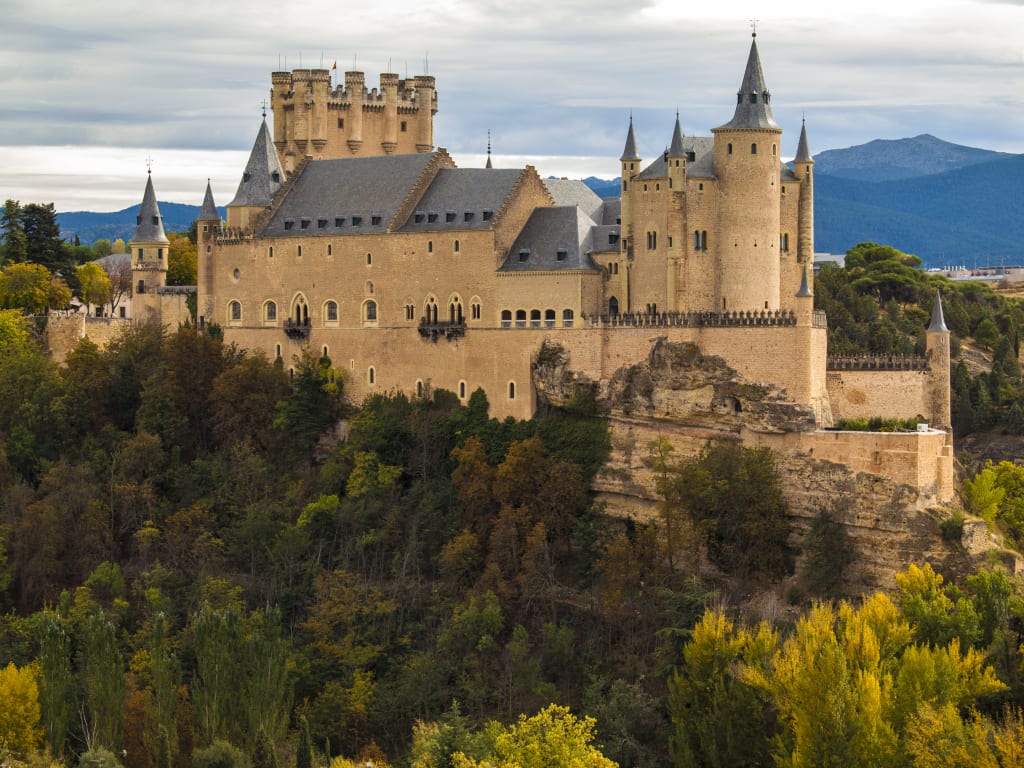An Uncrowned King Chapter 4 Part 1
A Candid Friendship

In the morning no reference was made to the conversation of the evening before on the part either of Caerleon or of Cyril, although the latter found an ominous confirmation of his suspicions in the fact that his brother did not offer to change his plans in any way as a consequence of what had been said.
“He must really be smitten with the girl,” argued Cyril, mentally, “for if he wasn’t, he would take fright at the hints I gave him, and want to part company with these people at once. Well, it’s his own look-out. He ought to marry, and it’s very evident that he’ll marry whom he likes. This girl is not bad-looking, and it’s a strong point in her favour that the O’Malachy daren’t set foot on English ground. A decent veil can be drawn over his existence so long as he keeps out of the way. At any rate, it’s not my business to make a fuss, and if I did, Caerleon would probably go and propose at once. I’m glad I said what I did, for now he knows what he’s about. He can’t say that he’s been let in for anything blindfold, but I mean to be satisfied with that.”
Having decided on adopting the attitude of benevolent neutrality, Cyril accompanied his brother without a murmur to the post-office, and the telegram refusing Count Temeszy’s invitation was duly despatched. Returning towards the inn, they took their way through the Kurgarten, a desolate piece of ground adorned with a few straggling bushes and a good many dilapidated plaster statues, and here they found the O’Malachy family, occupying three of the paintless and rickety chairs arranged in a circle round the kiosk in which the waters of the medicinal spring were dispensed by an unattractive Hebe. The O’Malachy was sipping his morning tumbler of greenish and muddy-looking fluid with the air of a martyr, while his wife, in the most coquettish of Parisian morning costumes and hats, was communicating to her daughter her impressions of the few other health-seekers who patronised the Janoszwar waters, the majority of whom were the Hungarian Jewesses she regarded with such strong aversion. Nadia sat bolt upright beside her, silent and rebellious, her face, with its expression of enforced resignation, protesting, as clearly as her attitude, against her mother’s discourse and the delight she took in it. The contrast between the two figures—the one so markedly rigid and repellent, the other all that was graceful, pliant, and pleasing—was a sharp one, and Caerleon, as he approached, found himself wishing emphatically, although in silence, that Nadia could manage to avoid the contamination of her surroundings without holding herself so aggressively aloof from them. Cyril was less reticent.
“Good gracious! how sulky that girl looks,” he remarked. “Wretchedly bad form to listen to her mother’s talk with that face on. Such talk as it is, too! I wish we had Madame O’Malachy at some of the houses one goes to in London. Her conversational powers are lost out here.”
“Perhaps Miss O’Malachy finds the talk less edifying than it is lively,” said Caerleon, absently, trying to put himself in Nadia’s place, and to realise the disgust which the stream of scandal and innuendo in which her mother delighted must arouse in her.
“Don’t be a prig,” was the sole answer vouchsafed by Cyril; and they went on and greeted the O’Malachys, and annexed two unoccupied chairs near them, Caerleon contriving to place himself beside Nadia, Cyril beside her mother. Presently the O’Malachy finished his penance, and they rose and sauntered together towards the hotel.
“We have heard from my son this morning, my dear marquis,” said Madame O’Malachy to Caerleon. “He hopes to be with us to-morrow.”
“Does he intend to make a long stay here?”
“Alas, no! He is still mad on the subject of Thracia, and insists on going there almost immediately. What can he expect but defeat and ruin? But he shall not go into danger alone. There are mineral springs at Tatarjé, which the O’Malachy has been advised to visit, and we shall all accompany my poor misguided Louis. We may not be able to do much, but at any rate we shall be near him.”
“But if the country is in such a dangerous state, are you not afraid to visit it?” asked Caerleon.
“Afraid!” repeated Madame O’Malachy, high scorn in her tone. “My dear marquis, for what do you take us? We are accustomed to danger.”
“I should rather like to see Thracia,” remarked Caerleon, not very relevantly. “It must be a very interesting country.”
“Then why wouldn’t you and Lord Cyrul come with us?” asked the O’Malachy.
“Oh no, my friend,” cried his wife, “that would never do. Have you forgotten the unsettled state of Thracia? Do you not remember that the people hate travellers, throw all kinds of vexatious restrictions in their way, seize every opportunity of insulting and injuring them? Our dear marquis must not come. The country is positively dangerous.”
“Is that intended as a reason for our not visiting it?” asked Caerleon. “Cyril, I think we’ll make a tour in Thracia.”
“Oh, all right,” said Cyril. “I hope your will is made, though as I am to be with you, it won’t much matter.”
“But you cannot intend this in earnest?” asked Madame O’Malachy, with a most ingenuous air of simplicity. “I tell you that it is absolutely dangerous to go to Thracia.”
“You are going the wrong way to keep our friends back, Barbara,” said the O’Malachy. “Do you not know that to hear that a place is dangerous makes ut their juty to visut ut?”
“But these English are so strange!” cried his wife, with artless amazement. “They write letters to their ‘Times’ to complain if the slightest inconvenience touches them at a hotel, or if a street-boy calls them a bad name, and yet they go to look for danger when it is unnecessary.”
“One of the contradictions of human nature,” remarked the O’Malachy, grimly, but when he and his wife and daughter had reached their own room, he returned to the subject: “I don’t know what you were driving at just now, Barbara. Were you really trying to turn the young fellers back, or not? Caerleon is a decent boy enough. Was your heart suddenly filled with compassion for um, or were you trying to make terms with your conscience?”
“That is it,” returned Madame O’Malachy, with a side-glance at her daughter. “I do not wish to have it on my conscience that I brought these young men into Thracia. It is not my affair.”
“Then whose is it?” asked Nadia.
“I say,” went on her mother, “that I have done all in my power to turn them back. I have not led them on to their ruin. I have not made myself disagreeable to my own family, and pleasant to them, that I might induce them to attach themselves to my company. When they get into trouble—into danger,” raising her voice as Nadia rose hurriedly and left the room, “their blood will not be on my head.”
“How you women hate one another!” laughed the O’Malachy, softly.





Comments
There are no comments for this story
Be the first to respond and start the conversation.